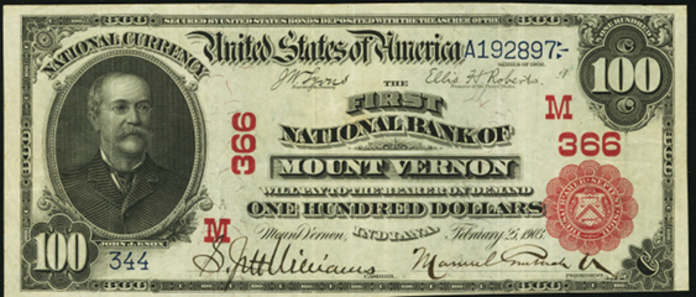One Hundred Dollar Notes › Nationals › 1902 One Hundred Dollar National Bank Notes › Pennsylvania Charters › 1902 $100 Hooversville Pennsylvania Citizens National Bank
Get Value Now
| Item | Info |
|---|---|
| Series | 1902 |
| Charter | #11413 Citizens' National Bank of Hooversville, Pennsylvania |
| Year Chartered | 1919, 288 Banks Chartered |
| City Info | Hooversville is a borough in Somerset County, Pennsylvania, United States. It is part of the Johnstown, Pennsylvania Metropolitan Statistical Area. The population was 779 at the 2000 census. Hooversville was established in 1836. The first settlers to claim land in the Hooversville area were George Lohr, Michael Kocher, and Casper Ripple, who died in 1828. Jonas Hoover, the founder of Hooversville, came to Quemahoning Township in 1834 and bought land from the heirs of Casper Ripple. In 1836, he had lots surveyed along the present Water and Main Streets. Jonas Hoover was a farmer who ran a gristmill and sawmill on Hoover Street in 1847. He was a justice of the peace from 1852 to 1862. He and David Crissey took part in establishing the German Reformed Church at Hooversville. Source: Wikipedia |
| Similar Cities | If your note doesn't match try: 1. Hooversville, Pennsylvania - First National Bank |
| Seal Varieties | Red, Blue |
| Other Info | 1. Value depends on notes known for charter, condition and market demand. |
| Neat Fact | Notes from common charters are less valuable compared to rarer charters. Value also depends on type, denomination and total notes known for city, state and region. Ultimate determination of value is collector demand. |
No Obligations Offers and Appraisals
Please submit a good photo or scan. It will be identified and evaluated. Understand there may be subtle differences between the image you see above and your note. Signatures, design, markings and note condition will determine the offer price. Notes in Uncirculated or better condition receive the best offers.
Appraisals can be estimated for wholesale and retail prices. Wholesale is what dealers typically pay. Retail is what a collector might pay. Retail is slightly higher in most cases.
Please visit this page for USA Paper Money Reference. Do not treat this page as a reference guide, it is for appraisal and acquisition purposes only.
